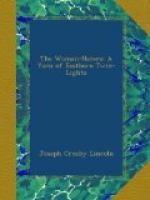Seth had taken a fancy to him at their first meeting. Now his liking steadily increased. Companionship in a lonely spot like Eastboro Twin-Lights is a test of a man’s temper. Brown stood the test well. If he made mistakes in the work—and he did make some ridiculous ones—he cheerfully undid them when they were pointed out to him. He was, for the most part, good-natured and willing to talk, though there were periods when he seemed depressed and wandered off by himself along the beach or sat by the edge of the bluff, staring out to sea. The lightkeeper made no comment on this trait in his character. It helped to confirm his own judgment concerning the young fellow’s trouble. People in trouble were subject to fits of the “blues,” and during these fits they liked to be alone. Seth knew this from his own experience. There were times when he, too, sought solitude.
He trusted his helper more and more. He did not, of course, permit him to take the night watch in the lights, but he did trust him to the extent of leaving him alone for a whole afternoon while he drove the old horse, attached to the antique “open wagon”—both steed and vehicle a part of the government property—over to Eastboro to purchase tobacco and newspapers at the store. On his return he found everything as it should be, and this test led him to make others, each of which was successful in proving John Brown faithful over a few things and, therefore, in time, to be intrusted with many and more important ones.
Brown, on his part, liked Seth. He had professed to like him during the conversation at the breakfast table which resulted in his remaining at the lights, but then he was not entirely serious. He was, of course, grateful for the kindness shown him by the odd longshoreman and enjoyed the latter’s society and droll remarks as he would have enjoyed anything out of the ordinary and quaintly amusing. But now he really liked the man. Seth Atkins was a countryman, and a marked contrast to any individual Brown had ever met, but he was far from being a fool. He possessed a fund of dry common sense, and his comments on people and happenings in the world—a knowledge of which he derived from the newspapers and magazines obtained on his trips to Eastboro—were a constant delight. And, more than all, he respected his companion’s desire to remain a mystery. Brown decided that Atkins was, as he had jokingly called him, a man with a past. What that past might be, he did not know or try to learn. “Mind your own business,” Seth had declared to be the motto of Eastboro Twin-Lights, and that motto suited both parties to the agreement.




